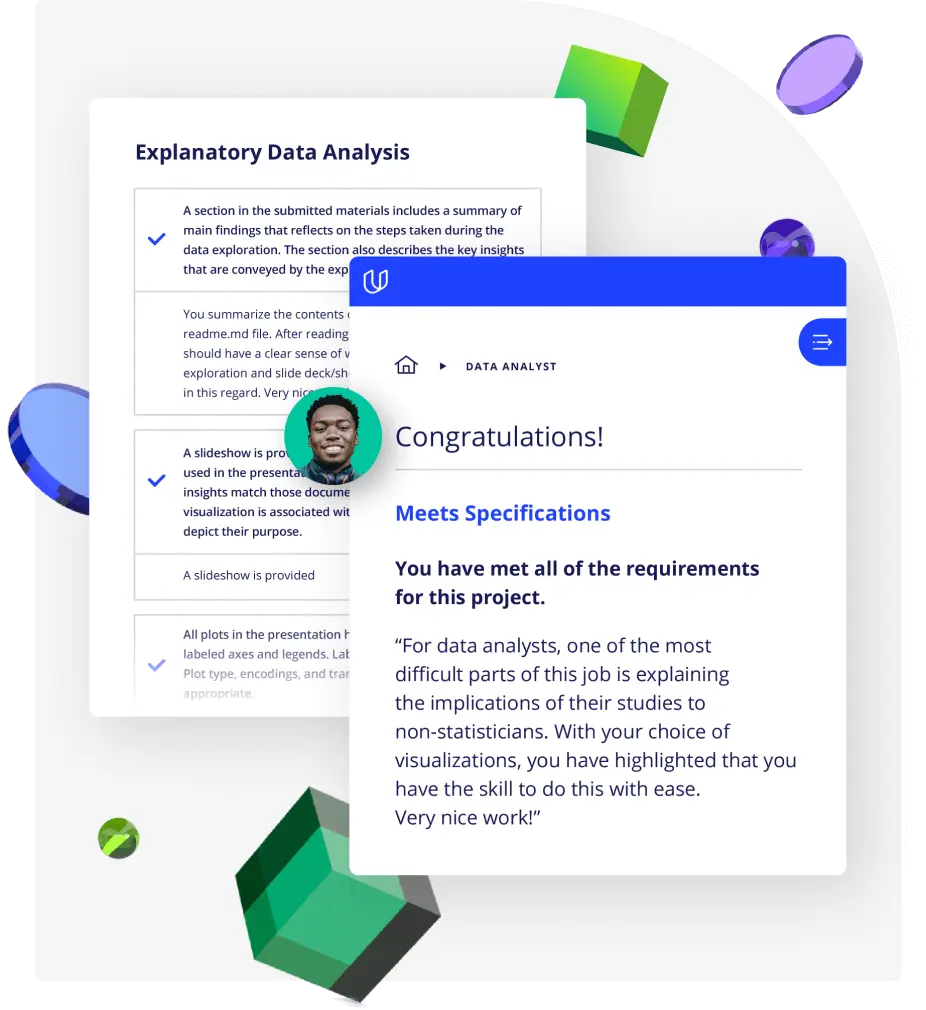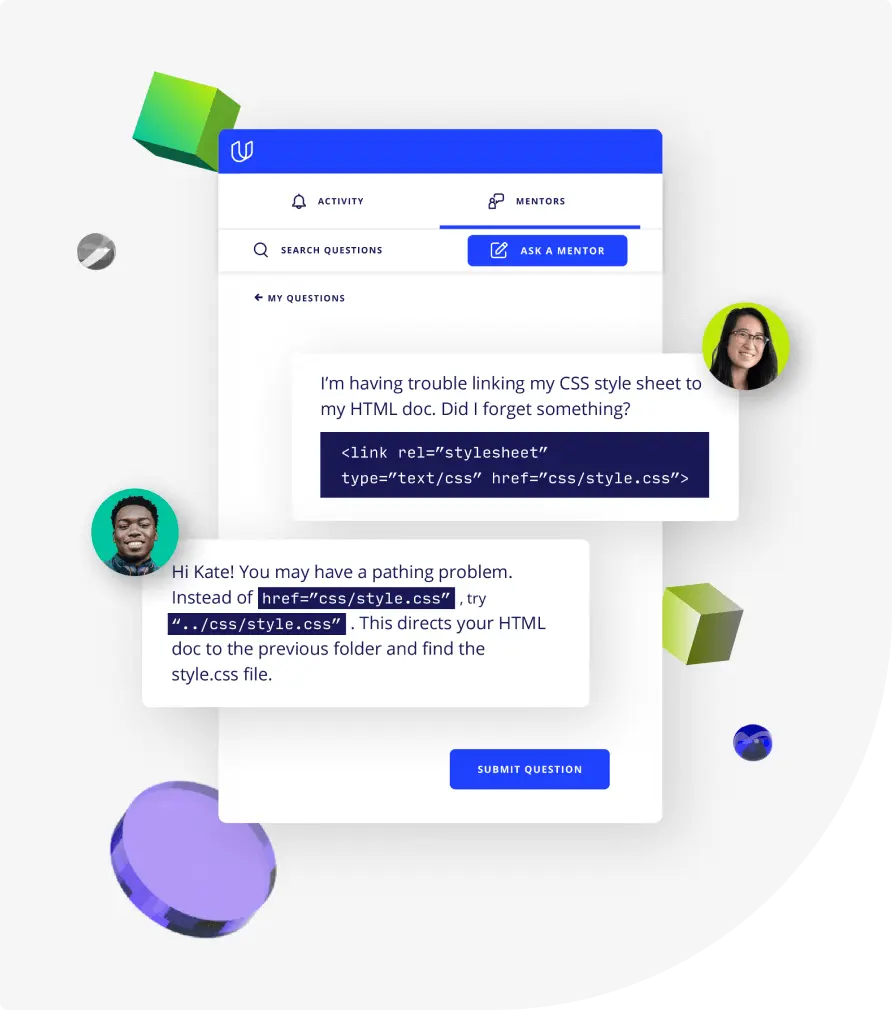Lesson 1
Welcome to Natural Language Processing
Welcome to the Natural Language Processing Nanodegree program!

Nanodegree Program
Master the skills to get computers to understand, process, and manipulate human language. Build models on real data, and get hands-on experience with sentiment analysis, machine translation, and more.
Master the skills to get computers to understand, process, and manipulate human language. Build models on real data, and get hands-on experience with sentiment analysis, machine translation, and more.
Advanced
2 months
Real-world Projects
Completion Certificate
Last Updated June 19, 2024
Skills you'll learn:
Prerequisites:
Course 1 • 42 minutes
This section provides an overview of the program and introduces the fundamentals of Natural Language Processing through symbolic manipulation, including text cleaning, normalization, and tokenization. You'll then build a part of speech tagger using hidden Markov models.
Lesson 1
Welcome to the Natural Language Processing Nanodegree program!
Lesson 2
You are starting a challenging but rewarding journey! Take 5 minutes to read how to get help with projects and content.
Lesson 3
What to do if you have questions about your account or general questions about the program.
Course 2 • 3 weeks
This section provides an overview of the program and introduces the fundamentals of Natural Language Processing through symbolic manipulation, including text cleaning, normalization, and tokenization. You'll then build a part of speech tagger using hidden Markov models.
Lesson 1
Arpan will give you an overview of how to build a Natural Language Processing pipeline.
Lesson 2
Learn to prepare text obtained from different sources for further processing, by cleaning, normalizing and splitting it into individual words or tokens.
Lesson 3
In this section, you'll learn how to build a spam email classifier using the naive Bayes algorithm.
Lesson 4
Learn Hidden Markov Models, and apply them to part-of-speech tagging, a very popular problem in Natural Language Processing.
Lesson 5 • Project
In this project, you'll build a hidden Markov model for part of speech tagging with a universal tagset.
Lesson 6
Learn how to build a simple question-answering agent using IBM Watson.
Course 3 • 4 weeks
Learn advanced techniques like word embeddings, deep learning attention, and more. Build a machine translation model using recurrent neural network architectures.
Lesson 1
An introduction of the course outline and prerequisite.
Lesson 2
Transform text using methods like Bag-of-Words, TF-IDF, Word2Vec and GloVE to extract features that you can use in machine learning models.
Lesson 3
In this section, you'll learn to split a collection of documents into topics using Latent Dirichlet Analysis (LDA). In the lab, you'll be able to apply this model to a dataset of news articles.
Lesson 4
Learn about using several machine learning classifiers, including Recurrent Neural Networks, to predict the sentiment in text. Apply this to a dataset of movie reviews.
Lesson 5
Here you'll learn about a specific architecture of RNNs for generating one sequence from another sequence. These RNNs are useful for chatbots, machine translation, and more!
Lesson 6
Attention is one of the most important recent innovations in deep learning. In this section, you'll learn attention, and you'll go over a basic implementation of it in the lab.
Lesson 7
This section will prepare you for the Machine Translation project. Here you will get hands-on practice with RNNs in Keras.
Lesson 8 • Project
Apply the skills you've learned in Natural Language Processing to the challenging and extremely rewarding task of Machine Translation.
Course 4 • 4 weeks
Learn voice user interface techniques that turn speech into text and vice versa. Build a speech recognition model using deep neural networks.
Lesson 1
Introduce the course outline and the course prerequisite
Lesson 2
Get acquainted with the principles and applications of VUI, and get introduced to Alexa skills.
Lesson 3
Build your own Alexa skill and deploy it!
Lesson 4
Learn how an automatic speech recognition (ASR) pipeline works.
Lesson 5 • Project
Build a deep neural network that functions as part of an end-to-end automatic speech recognition pipeline.

Instructor
Jay is a software engineer, the founder of Qaym (an Arabic-language review site), and the Investment Principal at STV, a $500 million venture capital fund focused on high-technology startups.

Instructor
Arpan is a computer scientist with a PhD from North Carolina State University. He teaches at Georgia Tech (within the Masters in Computer Science program), and is a coauthor of the book Practical Graph Mining with R.

Instructor
Luis was formerly a Machine Learning Engineer at Google. He holds a PhD in mathematics from the University of Michigan, and a Postdoctoral Fellowship at the University of Quebec at Montreal.

Content Developer
Dana is an electrical engineer with a Masters in Computer Science from Georgia Tech. Her work experience includes software development for embedded systems in the Automotive Group at Motorola, where she was awarded a patent for an onboard operating system.
Average Rating: 4.5 Stars
275 Reviews
Qu R.
March 20, 2023
so far so good!
Leonardo F.
December 26, 2022
great!
Navneet ..
October 10, 2022
contents are explanatory and lot of reference materials provided.
Ashish K.
October 3, 2022
Very useful.
Calvin K.
July 21, 2022
It's a bit too easy and would love to see more context about POS tagging. But overall the experience is pretty great.
Combine technology training for employees with industry experts, mentors, and projects, for critical thinking that pushes innovation. Our proven upskilling system goes after success—relentlessly.

Demonstrate proficiency with practical projects
Projects are based on real-world scenarios and challenges, allowing you to apply the skills you learn to practical situations, while giving you real hands-on experience.
Gain proven experience
Retain knowledge longer
Apply new skills immediately

Top-tier services to ensure learner success
Reviewers provide timely and constructive feedback on your project submissions, highlighting areas of improvement and offering practical tips to enhance your work.
Get help from subject matter experts
Learn industry best practices
Gain valuable insights and improve your skills

Unlimited access to our top-rated courses
Real-world projects
Personalized project reviews
Program certificates
Proven career outcomes
Full Catalog Access
One subscription opens up this course and our entire catalog of projects and skills.
Average time to complete a Nanodegree program
4 weeks
, Advanced
3 weeks
, Advanced
(909)
4 months
, Intermediate
(450)
3 months
, Advanced
(328)
2 months
, Advanced
(496)
5 months
, Advanced
4 weeks
, Intermediate
4 weeks
, Advanced
(235)
3 months
, Intermediate
4 months
, Intermediate
(256)
2 months
, Intermediate
1 month
, Intermediate
(87)
4 months
, Advanced
4 weeks
, Beginner
7 hours
, Fluency
8 hours
, Beginner

Natural Language Processing
4 weeks
, Advanced
3 weeks
, Advanced
(909)
4 months
, Intermediate
(450)
3 months
, Advanced
(328)
2 months
, Advanced
(496)
5 months
, Advanced
4 weeks
, Intermediate
4 weeks
, Advanced
(235)
3 months
, Intermediate
4 months
, Intermediate
(256)
2 months
, Intermediate
1 month
, Intermediate
(87)
4 months
, Advanced
4 weeks
, Beginner
7 hours
, Fluency
8 hours
, Beginner